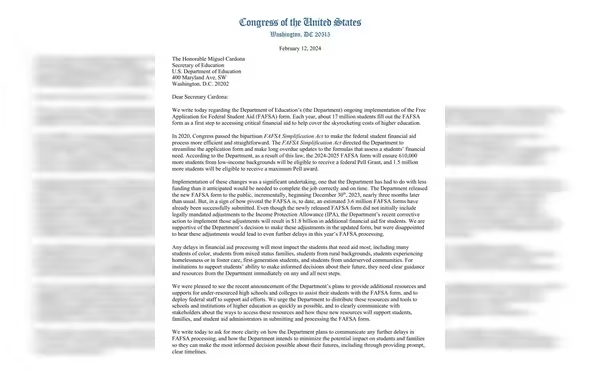Tuesday, July 2, 2024 03:51 PM
Department of Education Urged to Address FAFSA Challenges
- Enrollment in higher education increases by 1.2% post-pandemic.
- FAFSA processing delays threaten students' access to financial aid.
- Swift action needed to support students and institutions in higher education.
 Image Credits: KVOA
Image Credits: KVOAHigher education sees a positive shift in enrollment post-pandemic, but FAFSA processing delays raise concerns about financial aid access. Urgent action needed to support students and institutions in higher education.
Higher education is seeing a positive shift in enrollment numbers for the first time since the pandemic began, according to a recent report. In fall 2023, there was a 1.2% increase in undergraduate enrollment compared to the previous year, with about 176,000 more students attending colleges nationwide. This increase is a welcome change after years of declining enrollment that led to concerns about the sustainability of educational institutions.
The rise in enrollment can be attributed to various factors, including more older students enrolling, increased interest in certificate and vocational programs at community colleges, and returning students completing their degrees. However, the chaotic rollout of the new FAFSA (Free Application for Federal Student Aid) has raised concerns about potential setbacks in enrollment numbers for the upcoming academic year.
The FAFSA processing delays have resulted in a significant decrease in the number of students completing the form compared to previous years. This could have a detrimental impact on students' access to financial aid, particularly for those from low-income backgrounds. The uncertainty surrounding financial assistance may deter many students from pursuing higher education, further exacerbating existing concerns about affordability.
Experts are urging the Department of Education to address these issues promptly to prevent a potential decline in enrollment. The value of post-secondary education in fostering critical thinking skills and societal development remains crucial, but ensuring equitable access to these opportunities is paramount.
The challenges posed by the FAFSA complications highlight the need for swift action to support students and institutions alike. As colleges grapple with rising costs and accessibility issues, addressing these barriers is essential to safeguarding the future of higher education.













